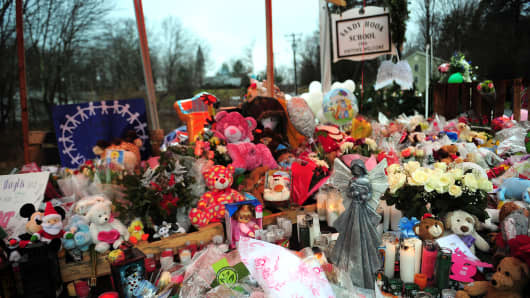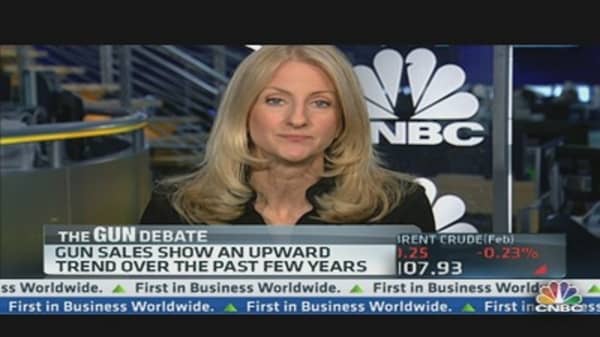Predictably, Friday's horrific events have rekindled talk of stricter gun laws, something the NRA has been warning would happen since President Obama won a first term back in 2008. In the run up to last month's election the powerful gun lobby warned of the "near certainty" a sweeping gun ban would be put in place if the President was re-elected.
Fear of stricter laws was a very big reason gun sales in the first half of this year were close to $2 billion dollars, according to a presentation this month by Smith & Wesson. This puts total sales for the year on track to easily exceed last years of about $2.7 billion. Other ways of measuring interest in gun ownership are on the rise as well. The FBI reports it has conducted 16.8 million background checks for gun permits this year — the highest number since it started publishing the data. Over a million and a half of those checks happened in November, which marked the 30th straight month of increases in background checks for gun licenses.
New state laws allowing for concealed weapons and the growing popularity of shooting as a sport are also cited as fueling the growth in guns, but it is the fear of not owning them that appears to have the biggest impact on industry growth.
Gun manufacturing in the U.S experienced a renaissance of sorts over the past few years. According to the Bureau of Alcohol, Firearms and Tobacco, which had data through 2010, manufacturing peaked in 2009, the year after Obama was first elected. That year, gunmakers produced 5,555,818 firearms. This exceeded the prior peak in 1994 — the year a now expired ban on assault weapons went into effect. (Read More:
After School Shootings, NRA All but Disappears From Facebook
)
So anti-gun chatter is likely to have a positive effect on gun makers. While the stocks of Smith and Wesson and Sturm, Ruger & Co., are down in Monday's session, sales could benefit. Smith and Wesson is forecasting an increase in sales in this fiscal year of between 35 percent and 38 percent, while Sturm, Ruger pointed to number of favorable industry trends in its last quarterly report. Both firms also generated operating margins in excess of 18 percent in the last fiscal year. Guns are not only big business, they are a profitable one too.





